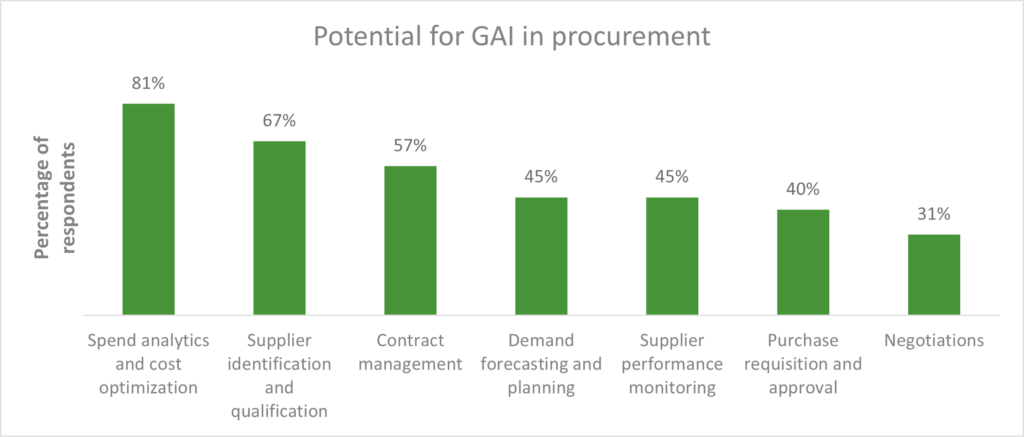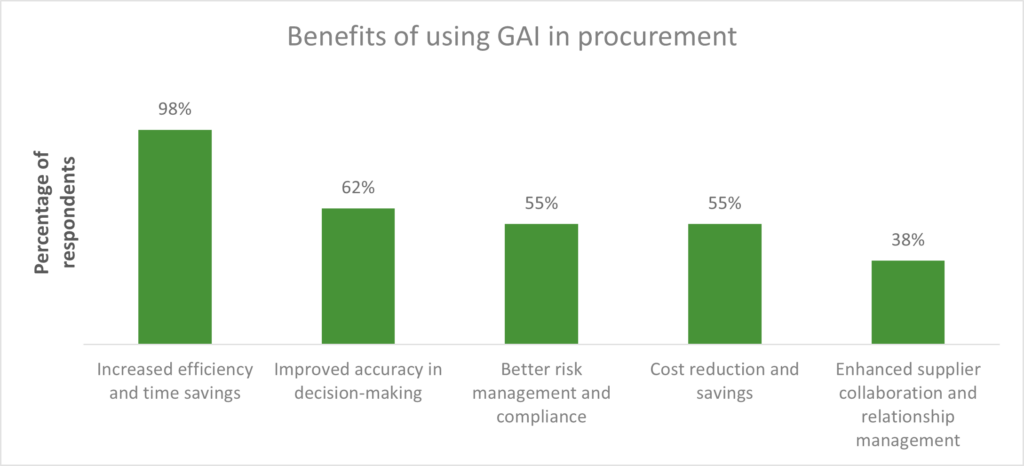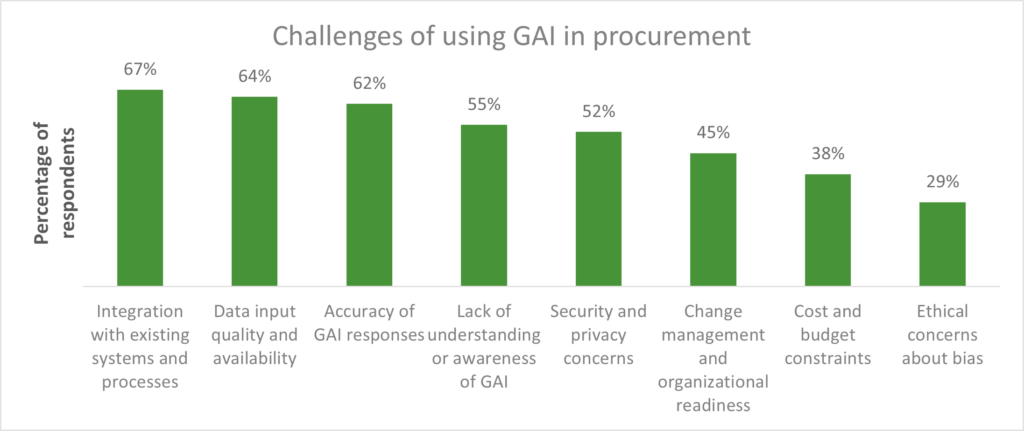Blog
Unleashing the Power of Generative AI in Procurement

Integrating Generative Artificial Intelligence (GAI) into Source-to-Pay (S2P) processes can reshape procurement operations. Our survey of procurement professionals found the technology holds great potential to transform spend analytics and cost optimization while increasing efficiency and saving time. To delve into the research findings and understand the potential benefits of Generative AI in procurement along with its challenges, read on.
- View a virtual event featuring a free-flowing discussion by our experts on the potential benefits, challenges, and considerations of incorporating GAI into the sourcing landscape: The Possibilities for Generative AI in Sourcing.
- To learn about use cases and the potential of GAI technology, watch our webinar: Welcoming the AI Summer: How Generative AI is Transforming Experiences.
In today’s dynamic landscape, leveraging cutting-edge GAI technology holds the promise to revolutionize procurement processes and enable organizations to stay ahead of the competition. By seamlessly integrating advanced algorithms and machine learning, GAI has the power to transform Source-to-Pay (S2P) processes, taking procurement to unprecedented heights of efficiency, accuracy, and innovation.
To understand how procurement professionals view the usage of GAI in procurement, we surveyed a diverse group of procurement experts, including Chief Procurement Officers (CPOs), category/sourcing managers, contract managers, supplier relationship managers, and various other executives.
Our research aimed to comprehensively assess GAI’s potential impact on procurement. In this blog, we examine the implications of GAI within the S2P framework based on the survey results and our expert insights from diligently monitoring this evolving landscape.
Potential for generative AI in procurement
GAI’s capabilities offer tremendous potential across multiple facets of S2P activities, leading procurement professionals toward elevated levels of efficiency and productivity.
The survey revealed that the majority of respondents believe that GAI will have the greatest impact on spend analytics and cost optimization. Additionally, a considerable number of procurement professionals recognized GAI’s potential for supplier identification and qualification. Contract management also emerged as a noteworthy area for GAI adoption.

Source: Everest Group quick poll on Generative AI in procurement
Let’s explore the potential implications in these areas:
- Spend analytics and cost optimization – GAI can help procurement professionals crunch through colossal datasets at an unparalleled pace, unveiling patterns and insights that would be unattainable through traditional means. By analyzing historical spending trends and market fluctuations, GAI can enable organizations to make data-driven decisions, optimize budgets, and identify opportunities for cost reduction
- Supplier identification and qualification – Supplier identification can be a daunting task, with a myriad of variables to consider. GAI can swiftly scan through vast supplier databases, evaluating factors such as financial stability, performance history, regulatory compliance, and other important aspects for the organization. This not only expedites the supplier selection process but also enhances overall supply chain resiliency
- Contract management – Manually managing contracts is prone to errors and inefficiencies. GAI can aid in drafting, reviewing, and updating contracts by extracting relevant clauses, identifying potential risks, and ensuring alignment with regulatory requirements. This level of automation can significantly reduce administrative overhead and enhance contract accuracy
Benefits of Generative AI in procurement
Integrating GAI into S2P activities can deliver many advantages that can reshape procurement operations. In the short term, GAI can provide immediate benefits by accelerating decision-making, reducing manual labor, and enhancing data-driven insights. Over the long term, GAI’s continuous learning capabilities enable it to refine its processes, adapt to evolving market dynamics, and become an indispensable partner in strategic procurement planning.
Almost all the procurement professionals surveyed stated that increased efficiency of procurement processes is seen as the major benefit of using GAI in procurement. GAI also is touted to play a key role in improving decision-making accuracy.

Source: Everest Group Quick poll on Generative AI in procurement
The survey found respondents believe GAI will deliver the following five key benefits:
- Increased efficiency and time savings – Automating routine tasks with the help of GAI can free up procurement professionals’ time to focus on strategic activities, leading to faster cycle times and improved productivity
- Improved accuracy in decision-making – GAI’s ability to analyze complex data and generate insights can help in making more accurate decisions, minimizing human biases and errors
- Better risk management and compliance – Data analysis enabled by GAI can highlight potential risks posed by suppliers, enabling proactive risk mitigation strategies to be put in place and ensuring compliance with regulations
- Cost reduction and savings – By helping procurement professionals optimize spending patterns and negotiate better contracts, GAI can contribute to significant cost reductions and overall savings for the organization
- Enhanced supplier collaboration and relationship management – GAI can enable proactive scenario planning, data-driven insights into supplier behavior, and customized contract generation. It can streamline negotiations and nurture long-term partnerships
Challenges of using Generative AI in procurement
Despite its transformative potential, integrating GAI into procurement presents several challenges. Next, we explore the multifaceted issues that procurement professionals might encounter when harnessing GAI’s capabilities within the intricate procurement landscape.
Most survey participants viewed the difficulty of integrating GAI with the current procurement systems and processes as a major obstacle to adopting GAI in procurement operations. Data input quality and availability followed as the next major impediment. Furthermore, the precision and reliability of responses generated by GAI is a concern, suggesting this also could pose a substantial barrier to successful adoption in procurement.

Source: Everest Group Quick poll on Generative AI in procurement
- Integration with existing systems and processes – Adapting GAI to fit seamlessly within an organization’s existing procurement systems and processes can be complex and requires significant technological integration
- Data input quality and availability – The accuracy of GAI’s insights heavily depends on input data quality and quantity. Inaccurate or incomplete data can lead to unreliable outcomes
- Accuracy of GAI responses – While GAI is highly advanced, it may still generate inaccurate or irrelevant responses, particularly when faced with complex and nuanced queries
Along with these challenges, navigating legal and regulatory frameworks, especially in industries with stringent compliance requirements, presents additional barriers to deploying GAI in procurement.
GAI’s potential in procurement is vast and transformative. By leveraging its capabilities across spend analytics, supplier management, contract optimization, and other S2P activities, organizations can reap numerous benefits. However, challenges about integration, data quality, accuracy, and regulatory compliance must be addressed for successful implementation.
As the procurement landscape evolves, its future lies at the intersection of the expertise of procurement professionals and effectively utilizing AI’s capabilities. Augmented procurement, where AI assists procurement professionals in decision-making, strikes a balance between harnessing AI’s efficiency and preserving human judgment, creativity, and intuition.
Everest Group will continue to follow the evolution in this space. To discuss the potential of Generative AI in procurement and S2P processes, please reach out to [email protected].